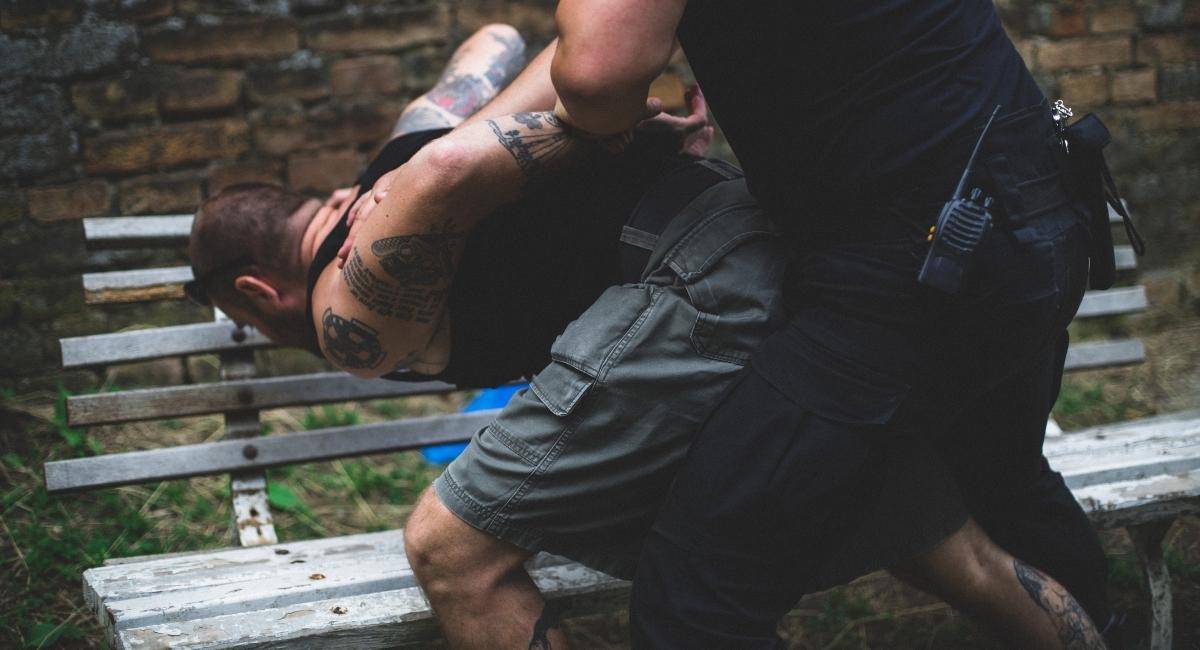Any person stopped by a police officer for suspected driving while intoxicated (DWI) offense may become immediately defensive about not violating state law and refuse to cooperate with any law enforcement procedures. When you do not comply with police requests relating to a DWI traffic stop, you could face additional criminal charges relating to a resisting arrest or evading arrest in addition to DWI, and you will need the help of a Denton DWI and resisting arrest attorney to overcome the criminal charges.
Resisting arrest and evading arrest are actually two different criminal offenses. Charges for either crime often involve many other possible accompanying charges, including possession of a controlled substance or unlawful possession of a firearm.

DWI and Resisting Arrest Defense Lawyer in Denton, Frisco, Lewisville, Flower Mound, TX
Were you arrested for a DWI and resisting arrest? You will want to work with a criminal defense attorney so you can fight the charges and have the best chance of achieving the most favorable outcome for your case. We understand how these situations can arise and can thoroughly examine your entire case and discuss every single legal option you might have.
Contact the Law Offices of Richard C. McConathy today at (940) 222-8004 for a consultation about your alleged offense in Denton, Frisco, Lewisville, Flower Mound, and surrounding areas of Denton County, Texas.
Difference Between Resisting Arrest and Evading Arrest in Denton
Texas Penal Code § 38.03(a) establishes that a person commits resisting arrest when they intentionally prevent or obstruct an individual they know to be a peace officer or a person acting in a peace officer’s presence and at their direction from effecting an arrest, search, or transportation of an alleged offender or another party by using force against the peace officer or another party. It is important to understand that Texas Penal Code § 38.03(b) provides that it is not a defense to these charges that an arrest or search was unlawful.
Resisting arrest will be a Class A misdemeanor, but it can be a third-degree felony when an alleged offender uses a deadly weapon to resist the arrest or search. Texas Penal Code § 38.04, on the other hand, states that a person commits evading arrest when they intentionally flee from an individual they know is a peace officer or special federal investigator attempting to arrest or detain them lawfully.
Evading arrest is a Class A misdemeanor, but the offense is a state jail felony if an alleged offender has a previous conviction for this same crime. The offense is a third-degree felony when an alleged offender uses a vehicle while being in flight, another party suffers some serious bodily injury because of an attempt by the officer from whom the alleged offender is fleeing to apprehend the alleged offender while they are in flight, or an alleged offender uses a tire deflation device against the officer while they are in flight.
Evading arrest is a second-degree felony when another party suffers death because of an attempt by an officer from whom the alleged offender is fleeing to apprehend them while they are in flight, or another party suffers serious bodily injury because of the alleged offender’s use of a tire deflation device while they are in flight.
Texas Transportation Code § 541.201 defines a vehicle as being a device that may be used to transport or draw persons or property on a highway, although it does not include a device exclusively used on stationary rails or tracks or manufactured housing as that term is defined under Chapter 1201 of the Texas Occupations Code. A tire deflation device is defined under Texas Penal Code § 46.01 as being any device, including a caltrop or spike strip, that, when it is driven over, impedes or stops the movement of a wheeled vehicle by puncturing one or more of a vehicle’s tires, although the term does not include a traffic control device designed to puncture one or more of a vehicle’s tires when driven over in a specific direction; and has a clearly visible sign posted in close proximity to the traffic control device prohibiting entry or warning motor vehicle operators of the traffic control device.
Texas Penal Code § 49.01 defines a watercraft as a vessel, an aquaplane, one or more water skis, or any other device used for transporting or carrying people on water, other than a device that is propelled only by the current of water.
DWI and Resisting Arrest Penalties
Criminal consequences of convictions for resisting arrest or evading arrest will vary depending on how an alleged crime is classified. The penalties may include any of the following sentences:
- Class A misdemeanor — Up to one year in jail and/or fine of up to $4,000
- Third-Degree Felony — Up to 10 years in prison and/or fine of up to $10,000
- Second-Degree Felony — Up to 20 years in prison and/or fine of up to $10,000
The state law concerning implied consent is found in Chapter 724 of the Texas Transportation Code, and it is Texas Transportation Code § 724.011 that establishes that when an individual is arrested for an offense arising out of any acts allegedly committed while operating a motor vehicle in a public place, or a watercraft, while intoxicated, that person is deemed to have consented to submit to the taking of one or more specimens of their breath or blood for analysis to determine their alcohol concentration or the presence in their body of a controlled substance, drug, dangerous drug, or other substance. Police officers usually have reason to believe that every person they stop for DWI offenses will comply with requests for alcohol testing.
It is important to note that there is no state law compelling people to comply with requests for field sobriety tests, which are the battery of tests used by police officers to determine if a person may be intoxicated. You can legally decline to perform these kinds of tests.
Texas Penal Code § 9.31(c) establishes that any use of force to resist an arrest or search can be justified when, before an alleged offender offers resistance, the peace officer or any person acting at their direction uses or attempts to use more force than necessary to make an arrest or search, and when and to the degree the alleged offender reasonably believes the force will be immediately necessary to protect themselves against a peace officer’s (or other person’s) use or attempted use of greater force than necessary.
Denton County DWI and Resisting Arrest Resources
Leos v. State, 880 S.W.2d 180 (Tex. App. 1994) — Victoria Police Department Officer Walter Landrum arrived at Christopher Casanova Leos’ home in response to reports of a disturbance and an allegation of criminal mischief in 1992. The officer knew Leos and initially approached him merely to discuss the reports, but remembering that Leos often carried a weapon in the past, Officer Landrum expressed caution. “You are not under arrest,” the officer said, “but for my safety I need to [pat] you down to make sure you have no weapons at all.” Leos initially allowed the frisk but then turned around and pushed Officer Landrum away, saying, “I am not going to go to jail.” Officer Landrum then told Leos that he was under arrest. Leos then ran toward the house, but Officer Landrum proved to be faster and prevented the escape. Leos was charged with and eventually convicted of resisting arrest and criminal mischief. His appeal did not contest his underlying conviction for criminal mischief. The Court of Appeals of Texas in Corpus Christi ruled that no rational trier of fact would have found Leos guilty beyond doubt of using force against the peace officer and sustained Leos’ sole point of error, reversing his conviction and rendering a judgment of not guilty.
State v. Mayorga, 901 S.W.2d 943 (Tex. Crim. App. 1995) — On July 20, 1991, Haydee Mayorga was involved in a minor motor vehicle accident in front of her home, but two police officers received information that she had outstanding warrants for her arrest, and informed her that she would have to accompany them to the jail, even though the officers later realized there were no outstanding warrants for her arrest and the charges relating to her outstanding warrants were dropped and Mayorga was still charged with resisting arrest. The trial court ultimately granted Mayorga’s motion to suppress, and the state then appealed the trial court’s order. The Fifth Court of Appeals reversed the ruling and remanded the cause for further proceedings, but Mayorga filed a petition for discretionary review, contending in her sole ground for review that Texas Code of Criminal Procedure § 38.23 requires suppression of evidence of resisting arrest when an alleged offender has been illegally arrested. The Court of Criminal Appeals of Texas ruled that because the court of appeals failed to address Ford v. State, 538 S.W.2d 633, 635 (Tex.Cr.App.1976) or Barnett v. State, 615 S.W.2d 220, 223 (Tex.Cr.App.1981), and did not have the benefit of Arizona v. Evans, ___ U.S. ___, ___, 115 S.Ct. 1185, 1188, 131 L.Ed.2d 34 (1995), at the time of its decision, it remanded the cause to the court of appeals for consideration in light of these opinions.
Find A Denton County Defense Attorney for DWI and Resisting Arrest Charges | Law Offices of Richard C. McConathy
If you were arrested for DWI and charged with resisting or evading arrest in Denton County, you need to be quick to retain legal counsel. A criminal defense lawyer will be very important in helping you overcome your criminal charges.
Contact the Law Offices of Richard C. McConathy today at (940) 222-8004 for a consultation about your alleged offense in Denton, Frisco, Lewisville, Flower Mound, and surrounding areas of Denton County, Texas.


